Vow To Return To The Weight Room
For George Lachapelle, life has always been simple. Family first. Work hard. Serve your country. Honor your creator. Take care of your body. Solve problems. Be happy.
In the 1940's, as a teenager growing up in Los Angeles, George held down several jobs to help provide for his single mother and five younger brothers and sisters. One day, his estranged father, whom George remembers as "a mean drunk," came knocking on their door, along with two ornery ruffians. George had earlier warned his father that if he ever tried to lay a hand on his mother again, there would be hell to pay. George tells the story matter-of-factly, without a hint of pride or self-satisfaction. "So my father brought two thugs with him to beat me up. I told them they looked pretty scruffy but after I was finished they'd look a whole lot worse." All three got religion real fast and walked away.
George was 17 years old.
Today, over half a century later, the spirit continues to burn strong in George. You can see it in his face, his baby face, which at the age of 73, is certainly a compliment. George smacks of vigor and exuberance. He has a full head of hair that Frankie Avalon would envy. He speaks earnestly: if those v-shaped worry lines on his forehead were a window into the man's soul, we'd be witness to an honest man's struggle to be frank without being rude or cold. At 5 foot 6, he's short, but powerfully built, with massive forearms and hands that have turned a few valves in their day.
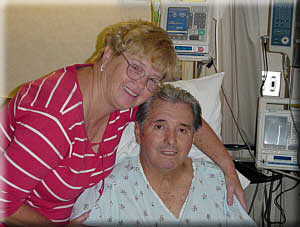
George, in a word, loves life, and he wants more of it. That's why he's always lifted weights, surfed and exercised. His mother, who is "part Apache," today lives a good life in her own home at the age of 93. His grandfather passed away at 107. George knows he's blessed with good genes but has never taken the future for granted.
Early this summer, George was hoisting iron and churning the Exercycle at his local 24 Hour Fitness center. He was walking at least a mile a day, usually down to the seashore, which is only a block away from his neat and tidy home in Huntington Beach. When he was not boogie boarding or hiking with his grandchildren, playing golf, bowling or practicing his karate, George was working part time for a local cleaning products manufacturer. The Lachapelle's own a television, but use it about as much as the rest of us use a blender.
Even after the grueling surgery that has helped save his life, you can see the outlines of a barrel chest that would raise the eyebrows of fitness guru Jack La Laine.
The surgery that saved his life. Those are his words. George has malignant pleural mesothelioma. When he was diagnosed this summer, Ruth, George's best friend and wife, did not hesitate. She and her daughters searched the Internet for the best doctor in the country. She discovered, in her words, "the best doctor in the East-- Dr. Sugarbaker -- and the best doctor in the West -- Dr. Cameron." They set up an appointment with Dr. Robert Cameron at UCLA Medical School in Los Angeles.
As George testified in his deposition, he had been advised by his local doctor that he had only a few months to live. He learned from Dr. Cameron that with surgery, and with follow up treatment later such as radiation and chemotherapy, George had a better chance to beat the odds. George did not hesitate. Allowing the status quo was a death sentence. He weighed the risks and he chose the surgery. Short term pain for, he hoped, long term gain.
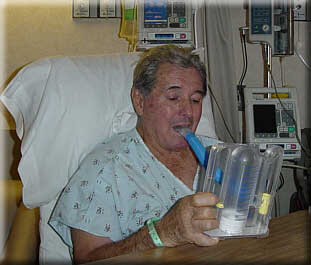
Dr. Cameron scheduled George for a pleurectomy / decortication, a surgical procedure in which the doctor attempts to remove all visible tumor from the chest wall, diaphragm, pericardium and lung. The procedure spares the lung, which itself may not be infiltrated by tumor. George's tumor, which had first been diagnosed in July via thoracoscopy and pleural biopsy, was confined to the right chest. Dr. Cameron ordered the usual battery of pre-surgery testing, including a PET scan, which showed that the tumor did crowd up against the diaphragm, raising the possibility of invasion of the abdomen.
On August 28, the day of the surgery, George and Ruth were ready for anything and put their faith in Dr. Cameron's deft hands and expertise. They had expected a 3-4 hour procedure. Instead, the surgery lasted well over 9 hours. The PET scan did not show the full extent of the tumor's reach. The surgeon found, unfortunately, that the tumor had trespassed across the heart and wrapped around the left aorta. Unable to resect the tumor embedded against the big vessel, Dr. Cameron meticulously excised as much tumor as he safely could and inserted markers so that the radiologist would later know precisely where to aim his radiation beams
George tries not think about the surgery. As he says, "my focus has been on survival." He defers to his wife Ruth on the details of the surgery. His chief recollection concerned not his own welfare, but that of Dr. Cameron. As George testified:
"All I know is this poor man [Dr. Cameron] spent 11 hours with me. I'm sure he did what he could and I'm sure he got most of those -- those -- those asbestos fibers off my lung and my chest. I'm sure he did because he's the best doctor on the west coast. I thank God that we got him."
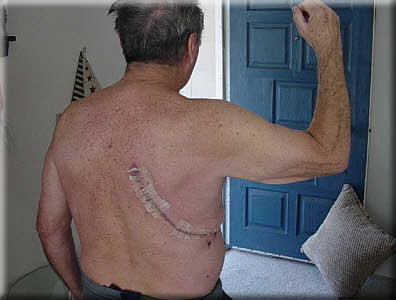
George's Scar Healing. George vows to return to his weight lifting and his former Jack La Laine physique.
It would feel good to say that the surgery and its aftermath was "a piece of cake." After all, George is not a complainer and we just feel better putting a happy face on what is in reality a traumatic and bloody ordeal. But never before had George -- robust and hearty George Lachapelle -- been closer to death. He required three pints of blood. He remained in intensive care for a few days, chiefly because of concerns about his blood loss and low blood pressure. George endured immeasurable pain. But, as is his way, George fought to drive the pain underground. He tried to deny and ignore it. When his doctors asked him to describe his pain between zero and ten, with ten meaning intolerable, George at first said he was at a 2 or a 3.He put off the oxycontin and other painkillers as long as he could. Later, George confided sheepishly that he was near the 8 or 9.
In George's mind, as with all athletes and high-achievers, if he could deny the pain, the underlying disease or trauma too would go away. He stated in his deposition:
"I was in my 30s when I first took an aspirin, because I believed that if you had a healthy body you didn't need pills. A fellow finally convinced me that a couple aspirins aren't going to kill you if you've got a headache. If I can avoid taking pills, I'll take the pain.
Beyond perhaps not taking all the pain pills his doctors have prescribed, George has followed Dr. Cameron's regimen, in his words, "religiously." Two days after his surgery, George was huffing on his spirometer, determined to keep the little blue ball over the 2500 cc mark. He was like an Olympic high jumper who simply would not rest until he had cleared the bar.
The recovery has been slow, but George's determination remains strong. He has not been sleeping well. He's been hoarse to the point where he misses talking to Ruth and feels badly about it because they used to spend so much time talking to each other. He's also been fatigued, very short of breath, and he's lost about 30 pounds. He worries not so much for himself, but for Ruth.
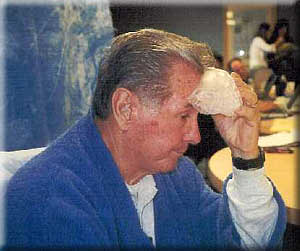
Ruth, he points out, has her own set of health troubles. She's plagued with neuropathy in her feet which gets so bad "it's like walking on needles." She has pain in her spine and she's blind in one eye, which puts restrictions on her driving the busy freeways of Orange County. Prior to his cancer diagnosis, George had done much of the grocery shopping and work around the house.
George is accustomed to denying his own pain, but the pain he can't shake is knowing that because of his mesothelioma he's unable to help his wife around the house with the chores and shopping. "Now she's even got to bathe me. That's what really hurts. She's got so much to do and it just isn't fair."
As for the future, George and Ruth are taking it one day at a time. George doesn't want to hear the grim statistics. He doesn't want to hear doctors talk about life spans. He's focused on living, in the here and now. He's gearing up for the 30-38 radiation treatments he's scheduled to start getting on November 11th. He's psyching himself up to extend his daily walk a little bit further every day. He's looking forward to November 1st, when he, Ruth and about 50 family members and guests will celebrate their 35th wedding anniversary (Ruth has asked guests in lieu of gifts to send donations to the Mesothelioma Applied Research Foundation, www.marf.org). And he appreciates and continues to need the prayers and warm wishes from his loving family and friends.
George knows that progress is simply a return to normalcy, a return to the days when he could play with his grand kids, walk on the beach, go bowling, and take his wife shopping. He's got faith in those who love and care for him. At the same time, he knows he's in the middle of the fight for his life. When he ponders about how his mesothelioma has disrupted the promise of a long life -- "I knew I always had at least another twenty years" -- his mood turns somber. "I feel robbed."
I asked George in his deposition if he was the type of guy who would complain or fake an injury just to get sympathy or a day off. George worked for over 30 years at Standard Oil/Chevron in Ventura/Orange County basin. His answer was both typical and refreshingly honest:
No. Again, you probably think I'm nuts, but I love working. I mean, I went for years without even being late. I just like working. I like accomplishing things. I just like getting things done. I think that's the way I look at the state of health I'm in, I know eventually I'll be okay, but I'm not going to get okay unless I do something about it. So all the exercises that they have me do, I do them pretty religiously. And my deep breathing I do as much as possible, more than they expect, because I want to get healthy.
We do too George. Keep walking, keep up the deep breathing, and keep the faith.
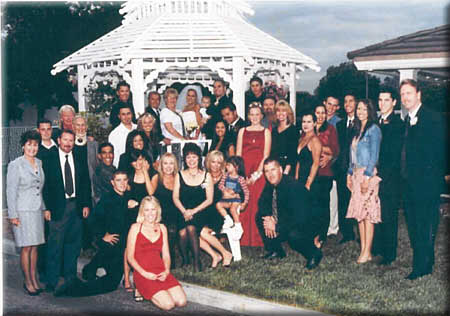
Addendum: According to Dr. Robert Cameron's surgery report of August 28, 2003, the operative findings during the bronchoscopy, thoracotomy, parietal pleurectomy and decortication found extensive tumor which wrapped around posteriorly and posterior to the esophagus to the left side of the aorta which could not totally be removed in this area.
*** POSTED OCTOBER 29, 2003 ***
An Update -- 5/17/04
George underwent surgery to place a stent in his esophagus. He had been unable to eat or swallow food and Dr. Cameron felt that this surgery would open up his esophagus enough to allow him to eat. Currently, he doesn't eat much, but he is eating more and is able to keep the food down.
Prior to his surgery, George had refused any pain medication. He has a very high tolerance for pain and would only allow himself to take Aleve. Dr. Cameron told George that "when you are in pain, you have no appetite and if you don't eat you cannot get stronger." Dr. Cameron prescribed Vicodin three times a day, however, George really doesn't like the way it makes him feel so he will only take it when the pain becomes intolerable. Ruth feels that once he builds up a tolerance for the Vicodin and realizes that he can be pain free, he be more likely to follow the prescribed dosage.
Mr. George Lachapelle passed away on September 4, 2004


